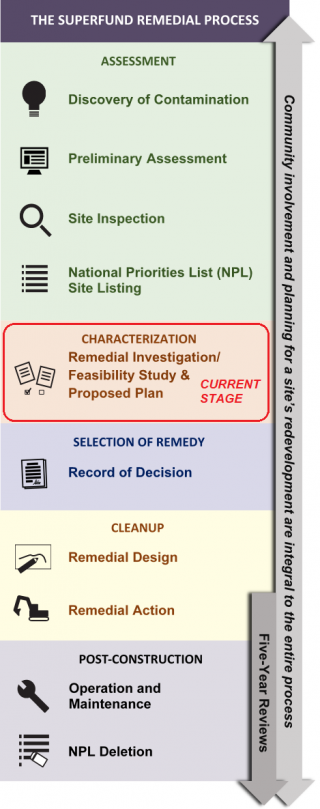Cherokee Zinc-Weir Smelter National Priorities List (NPL) Superfund Site, Weir, Cherokee County, Kansas – Fact Sheet, February 2022
EPA Announces Placement of Site on National Priorities List and Virtual Public Availability Session
Virtual Public Availability Session

The U.S. Environmental Protection Agency (EPA) Region 7 will hold a Virtual Public Availability Session to provide information and answer questions about the Cherokee Zinc-Weir Smelter Superfund Site. EPA and ATSDR will present information about the Superfund remedial (cleanup) process, National Priorities Listing, community involvement, technical assistance resources, and risk assessments to be conducted at the site. Following the presentations, agency representatives will be available to take questions in a virtual format.
Public Availability SessionThe virtual event will be hosted online on Thursday, Feb. 10, 2022, from 6 to 7 p.m. Click this link to join the event on Feb. 10. EPA is committed to providing reasonable accommodations to individuals with disabilities. For reasonable accommodations during the Public Availability Session, please contact Troi Augustine at 1-800-223-0425 or troi.augustine@epa.gov. |
Site Overview
The Cherokee Zinc-Weir Smelter Superfund Site, located in the city of Weir, Cherokee County, Kansas, has been added to EPA’s Superfund National Priorities List (NPL). The NPL is a list of the nation’s hazardous waste sites with the highest priority for cleanup.
Lead is the primary contaminant of concern at this site. Lead is a toxic metal that is harmful if inhaled or swallowed and can pose serious health risks, particularly to children 7 years old and younger, as well as pregnant women and nursing mothers. (See below for links to information about lead risks.)

The Chicago Zinc Works Company and several other companies owned and operated a primary zinc smelter from approximately 1873 until 1918 in Weir. The Weir location was chosen due to nearby commercial coal deposits available to fuel the smelter and the proximity to the Tri-State Lead and Zinc Mining District. According to historical information, smelting operations closed around 1918 when natural gas wells in other areas of Kansas made smelter operations using coal less profitable.
Site Background
Between 2004 and 2013, the Kansas Department of Health and Environment (KDHE) conducted soil testing at the former smelter, as well as nearby properties. The sample results identified several properties with elevated lead levels. KDHE then requested EPA to further evaluate residential lead contamination in Weir associated with the former Cherokee Zinc smelter. These investigations have identified elevated levels of lead in residential yards and the smelter property in Weir, which appear to be attributable to the operations at the former Cherokee Zinc smelter. Therefore, additional investigation is needed.
Future Site Actions
The NPL listing for the site was effective on Sept. 9, 2021. Listing of this site makes it eligible for response action money authorized by Congress under the Comprehensive Environmental Response, Compensation and Liability Act (CERCLA), commonly known as Superfund.
Now that the site is listed on the NPL, a Remedial Investigation (RI) will be performed to fully define the nature and extent of the contamination. The RI will include additional sampling at the site and an evaluation of risk to human health and the environment.
Following the RI, a Feasibility Study (FS) will be prepared. The FS includes evaluations of technologies capable of treating the contamination. It also includes an assessment of the cost and performance of technologies that could be used to clean up the site. EPA will work to inform the community about site progress throughout all phases of the cleanup.
Once the RI/FS stage is complete, EPA will issue a Proposed Plan to address the contamination with opportunities for public comment. A graphic of the Superfund Process is in the online version of this Fact Sheet. Fact Sheets for Kansas cleanup sites are available online.
Annual Blood Lead TestingEPA encourages parents and caregivers to have their children tested for lead exposure at least once per year. The only way to know if your child has an elevated blood lead level is to have his or her blood tested. Talk to your pediatrician, general physician, or local health department about testing your child. For example, you can contact the Cherokee County Health Department, 110 East Walnut, Columbus, KS 66725; 620-429-3087. Visit their website (testing by appointment). Or you can contact: Community Health Centers of Southeast Kansas; blood lead testing for established patients (by appointment only). For their locations, visit their website. |
Protect Your Family From Lead Hazards
For more information about lead, visit:
- EPA's Lead page
- EPA's Protect Your Family From Lead Hazards page
- EPA's Lead at Superfund Sites page
- CDC’s Lead page
- ATSDR's ToxFAQs™
Information Repository and Administrative Record Availability
Site project information is available to the public at web repositories. To view cleanup documents, including the Administrative Record, visit EPA’s Site Profile Page.
If you don’t have internet access, you can view these documents during normal business hours at the following locations:
EPA Region 7 Records Center
11201 Renner Boulevard
Lenexa, KS 66219
1-800-223-0425
Weir Public Library
111 East Main
Weir, KS 66781
620-396-8899
For more information, see the related Public Notice. For prior Fact Sheets about the site, visit EPA's website.
EPA Contact Information
If you have questions about this Fact Sheet, would like to receive site updates, or need additional information, please contact EPA:
Tanya Young
Community Involvement Coordinator
U.S. EPA Region 7 (CEERD/CPSIB)
11201 Renner Boulevard
Lenexa, KS 66219
Email: young.tanya@epa.gov or r7-tsmd@epa.gov
Phone: 816-799-3251
Toll-free: 1-800-223-0425
Rachael Puleo
Remedial Project Manager
U.S. EPA Region 7 (SEMD/LMSE/SES)
11201 Renner Boulevard
Lenexa, KS 66219
Email: puleo.rachael@epa.gov
Phone: 816-912-8844
Toll-free: 1-800-223-0425
